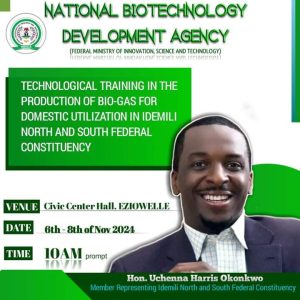NAFDAC Reopens Ogbu-Ogu Market in Onitsha After Months of Closure: A New Dawn for Drug Traders
Normalcy has returned to the bustling Bridge Head Drug Market in Onitsha, popularly known as Ogbu-Ogu Market, following its reopening by the National Agency for Food and Drug Administration and Control (NAFDAC). The decision comes after months of tension, scrutiny, and stringent regulatory enforcement that saw the once-thriving pharmaceutical hub grounded in silence.
The reopening marks a significant milestone for drug traders, healthcare regulators, and the Anambra State Government, all of whom have been involved in painstaking negotiations, compliance checks, and infrastructural reforms to restore the integrity of the pharmaceutical supply chain in the region.
The Ogbu-Ogu Market, one of the largest drug distribution centers in West Africa, was closed in late 2023 by NAFDAC over concerns related to the illegal sale of counterfeit, expired, and unregistered pharmaceutical products. The closure was part of a nationwide crackdown on fake drugs and substandard healthcare products.
The enforcement action followed intelligence reports and coordinated investigations led by NAFDAC’s Directorate of Investigation and Enforcement. Pharmacies, wholesale distributors, and unregistered dealers within the market were implicated in illicit activities deemed detrimental to public health and safety.
NAFDAC stated that the closure aimed not only to sanitize the market but also to protect the integrity of Nigeria’s drug distribution system. However, the action sent shockwaves across the pharmaceutical ecosystem in the Southeast, triggering economic losses and heated debates over the balance between regulation and livelihood.
Following the initial shutdown, drug traders in Onitsha, under the leadership of market executives and with support from the state government, began a rigorous process of dialogue and compliance. Traders were required to undergo screening by NAFDAC, register their businesses, verify the authenticity of their products, and commit to future regulatory adherence.
YOU MAY READ
Peter Obi Slams NAFDAC Over ₦700,000 Fee to Reopen Shops in Onitsha: A 3,000-Word In-Depth Report on Regulation, Accountability, and the Plight of Nigerian Traders
During a recent inspection visit to the reopened market, Anambra State Commissioner for Information, Dr. Law Mefor, commended the progress made and verified that NAFDAC had indeed authorized the resumption of business activities.
“We are here to ensure that the market has truly reopened and that traders are complying with the regulations. We’re satisfied with what we’ve seen,” Dr. Mefor stated, emphasizing that 95% of the shops have now reopened while only 5% remain under lock due to non-compliance.
Dr. Mefor was accompanied by the Commissioner for Health, Dr. Afam Obidike, who reassured the drug traders that the state government remained committed to their welfare and economic prosperity.
Governor Chukwuma Charles Soludo played a pivotal role in mediating between NAFDAC and the market leaders. According to the Chairman of the Onitsha Drug Market, Mr. Chukwuleta Ndubisi, it was the Governor’s intervention that led to a reduction in the duration of the market’s closure.
“Governor Soludo’s fatherly intervention made a big difference. His appeal to the regulatory agencies allowed us to regain our livelihoods sooner than expected. We are grateful to him,” said Mr. Ndubisi.
The state government, in its bid to modernize the pharmaceutical sector, has also commenced the construction of a new ultramodern drug market in Oba. The project is expected to meet international standards, with facilities for proper storage, quality control, and regulatory oversight.
Dr. Afam Obidike noted that the Oba project is on schedule and will soon become the new benchmark for drug distribution in the country.
In an interview during the inspection, Pharm. Omoyeni Babatunji, Deputy Director in charge of Investigation and Enforcement for the South-South and South-East zones, reiterated NAFDAC’s mission to safeguard public health without unnecessarily disrupting economic activities.
“We’re happy to report that 95% of the market is back in operation. Those whose shops remain closed have either not presented themselves for screening or failed to meet our directives. This process is in place to ensure that only compliant dealers are allowed to operate,” said Pharm. Babatunji.
He added that the agency would continue to monitor the market and ensure that the standards achieved during the reopening process are maintained.
The closure had significant economic consequences for thousands of traders, wholesalers, suppliers, and transporters who depend on the Ogbu-Ogu Market for their daily sustenance. With the reopening, many of these individuals have begun to recover from months of income losses.
Mrs. Ifeoma Eze, a pharmaceutical wholesaler, expressed relief at the reopening, stating, “It was like a nightmare for us. We lost customers, stock expired, and we couldn’t pay our workers. But now we have hope again. We will never joke with NAFDAC rules again.”
Transport operators and petty traders around the market have also resumed operations. Food vendors, porters, and local supply chain agents who were out of work for months are gradually returning to their daily activities.
YOU MAY READ
NAFDAC Uncovers Fake Drug and Injectables Factory in Delta State
The reopening of the Ogbu-Ogu Market provides several key lessons for regulatory agencies, government institutions, and private business owners.
1. Regulatory Compliance is Non-Negotiable: The incident underscores the importance of adhering to health and safety regulations, especially in sensitive sectors like pharmaceuticals.
2. Government Mediation is Essential: The constructive role played by the Anambra State Government shows that effective governance involves balancing public safety with economic realities.
3. Stakeholder Engagement Works: The collaboration between market leaders, government officials, and NAFDAC led to a sustainable resolution and avoided prolonged hardship.
4. Infrastructure Modernization is the Future: The Oba Drug Market project symbolizes a move toward structured and monitored marketplaces, reducing the risk of regulatory breaches.
Nigeria’s battle against counterfeit drugs is a longstanding one. The World Health Organization estimates that a significant percentage of drugs in circulation in developing countries are either substandard or fake. In Nigeria, NAFDAC has over the years ramped up efforts to eliminate this threat through digital tracking, raids, and collaborations with local and international partners.
The Ogbu-Ogu closure and reopening are part of a broader campaign to reposition Nigeria’s pharmaceutical industry as credible, safe, and globally competitive.
“Public health must come first. We know that the economy is important, but without health, there is no economy. This reopening is a win-win situation for everyone,” said Pharm. Babatunji.
During the inspection tour, market leaders appealed to both the state government and NAFDAC for continued engagement and periodic training sessions to help traders stay informed about evolving regulations.
“Many of us are willing to do the right thing, but we need guidance. Regular sensitization will help us avoid such disruptions in the future,” said Mr. Ndubisi.
The traders have also called for support in digital registration of products, warehousing, and logistics to reduce their dependency on middlemen and questionable supply chains.
As shops reopen, traders are not only restocking but also rebranding. Several dealers are painting their shops, installing digital thermometers, and acquiring basic quality assurance tools. There’s a visible commitment to start anew with a higher standard of professionalism.
“We want our customers to know that we’re back, and we’re better. We will no longer tolerate the sale of fake or unregistered drugs in this market,” said Chika Okwara, a young pharmacist.
The Ogbu-Ogu market has also inaugurated a compliance taskforce within the market association. The taskforce will conduct periodic internal audits and serve as the first line of discipline for any violations observed.
In the Onitsha community and beyond, the reopening has been met with joy and cautious optimism. Residents who depend on the market for affordable and accessible medicines are relieved that their primary source of healthcare products is back in operation.
“We were really suffering. Many of the chemists in the villages depend on this market. Now we can buy drugs again at better prices,” said Mrs. Ngozi Ikenna, a community nurse.
However, stakeholders emphasize that the joy must not lead to complacency.
The reopening of the Ogbu-Ogu Drug Market is more than a return to business; it is a rebirth of Nigeria’s pharmaceutical trade values. The months of closure, though painful, have forced a reevaluation of standards, a recommitment to ethics, and a reimagination of what a compliant, safe, and prosperous drug market can look like.
With 95% of shops now operational and new structures in place to monitor compliance, the market is poised for a future that balances profit with public health. The lessons learned in Onitsha could well become the template for similar markets across the country.
The road ahead remains filled with challenges, but for the drug traders, regulators, and government officials involved, this moment is a testament to what can be achieved through cooperation, integrity, and an unflinching commitment to the common good.





